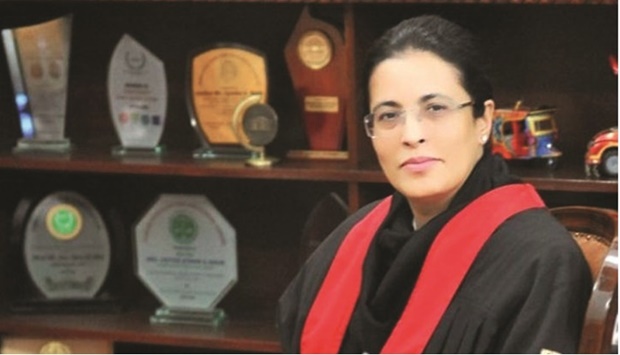Pakistan swore in Ayesha Malik as its first female Supreme Court judge yesterday, a landmark occasion in a nation where activists say the law is often wielded against women.
Malik attended a ceremony in the capital Islamabad where she now sits on the bench alongside 16 male colleagues at Pakistan’s highest court.
“I want to congratulate Justice Ayesha Malik on becoming the first woman judge of the Supreme Court,” Prime Minister Imran Khan said.
“I wish her all the best,” he added on Twitter.
Lawyer and women’s rights activist Nighat Dad said Malik’s promotion is “a huge step forward”.
“It is history in the making for Pakistan’s judiciary,” she told AFP.
Malik was educated at Harvard University and served as a high court judge in Pakistan’s eastern city of Lahore for the past two decades.
She has been credited with rolling back patriarchal legal mores in her Punjab province jurisdiction.
Last year she outlawed a deeply invasive and medically discredited examination used to determine a woman’s level of sexual experience.
Women in Pakistan often struggle to gain justice in rape and sexual assault cases, and the test was deployed as a means of discrediting victims by casting aspersion on their character.
Malik’s elevation to the apex court of Pakistan may clear the way for more women to enter the historically conservative and male-dominated judiciary of the Islamic republic.
“She has broken all barriers in the judicial system and it will allow other women in the system to move forward,” said lawyer and women’s rights activist Khadija Siddiqi.
“I hope this will lead to more women-centric decisions by the judiciary in the future.”
But her appointment has been mired in controversy for the past four months, with claims she jumped a queue of more senior male candidates qualified for the post.
Earlier this month the Pakistan Bar Council staged a strike to protest against Malik’s nomination.
Those in favour of her elevation pointed out that seniority was not a requirement for appointment to the apex court according to the Constitution and that the country’s judicial history is full of instances of male judges from provincial high courts being elevated without consideration to seniority.
After the parliamentary committee approved her appointment, Senator Farooq H Naek, who heads the body, had said the committee still believed in the principle of seniority for appointment of judges, but the approval for Justice Malik was given because it was the first time a woman was being elevated to the apex court. “We have approved Justice Malik’s name in national interest,” the senator had said.
Lawmakers across the political spectrum as well as journalists rejoiced, sharing pictures and videos of the oath-taking ceremony and terming it “historic” and “inspirational”.
Information Minister Fawad Chaudhry, while sharing a shot from the ceremony, said the picture was powerful and symbolised women’s empowerment in the country. “I hope she will be an asset to our judicial hierarchy … Congratulations #JusticeAyeshaMalik, a landmark elevation,” he tweeted.
Opposition Pakistan People’s Party leader Sherry Rehman congratulated the newly appointed judge, sharing a picture of the ceremony with the caption: “This is a picture full of promise and hope for the wonderful, talented, bright, courageous young women of Pakistan! Follow your dreams, be the change.”

HISTORY-MAKER: Ayesha Malik.
